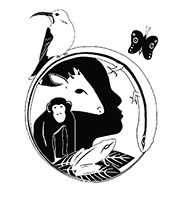Principal Investigator
 Thomas Smith – Center for Tropical Research, UCLA
Thomas Smith – Center for Tropical Research, UCLA
Dr. Thomas Smith is the lead scientist heading this collaborative research project. As the founder and director of the Center for Tropical Research, Institute of the Environment and Sustainability, and a professor in the Department of Ecology and Evolutionary Biology at University of California, Los Angeles, he has more than 25 years of experience working in the rainforests of Africa, Australia, Latin America, and Hawaii. A central focus of his research investigates how biodiversity is generated and maintained in tropical rainforests. Combining molecular genetics and field biology, he identified a new theory of how speciation occurs in rainforests. In a series of recent studies, he has shown that for a wide range of taxa in rainforests worldwide, the processes of diversification and speciation take place not only within “biodiversity hotspots” but also along environmental gradients or ecotones representing the transition from one habitat to another. The results of Dr. Smith’s research point to new and more effective ways of prioritizing regions for conservation. In recent years his research has also focused on studying evolution in human-altered environments, the ecology of disease, and developing new approaches for mapping adaptive variation in species to mitigate the effects of climate change. Dr. Smith is a frequent consultant for conservation organizations. Working with the World Bank and international conservation organizations, he has helped implement conservation programs and establish new national parks in tropical countries.
Co-Principal Investigators
 Mary Katherine (Katy) Gonder – Drexel University
Mary Katherine (Katy) Gonder – Drexel University
Dr. Gonder is an associate professor of biology at Drexel University. Her research is focused on examining the history of the Gulf of Guinea and Congo Basin rainforests, which are among the most important centers of biological diversity in the world. Currently, Dr. Gonder’s research can be divided into three major programmatic areas focused on: (1) understanding spatial patterns of biodiversity across Central Africa; (2) inferring the underlying evolutionary and ecological processes that generate the rich biodiversity of the region; and (3) helping to inform conservation strategies for the region that recognize and integrate evolutionary pattern and process. While the bulk of her research to date has emphasized primates–especially chimpanzees–the research is not taxon bound. Her research group is currently pursing research in a range of tropical vertebrates, with the explicit aim of improving biodiversity prediction and conservation in central Africa, a region that is undergoing rapid climatic and demographic change. Dr. Gonder has worked in central Africa for nearly twenty years, primarily in Cameroon and Nigeria, and more recently, in Gabon and Equatorial Guinea. She has co-hosted a number of international technical workshops in central Africa, and serves as a member of the IUCN Primate Specialist Group (Section on Great Apes). As a co-principal investigator on this project, Dr. Gonder is responsible for coordinating studies on chimpanzees (Pan troglodytes) and in a plant belong to the Marantacae (Sarcophyrnium prionogonium). She is helping to coordinate several education and outreach activities in Cameroon supported by the NSF-PIRE program and the Arcus Foundation.
 Nicola Anthony – University of New Orleans
Nicola Anthony – University of New Orleans
Dr. Anthony is an evolutionary biologist with broad interests in molecular ecology, phylogeography and conservation biology. She began work in Gabon over 12 years ago as a postdoctoral researcher on a Darwin Initiative project whose main aim was to develop a collaborative research program in western lowland gorilla genetics and build capacity in conservation education at the university level. Since joining the University of New Orleans, much of the research in her group has focused on understanding the role that history, landscape and ecology have played in shaping the diversification of tropical forest taxa. She is also very interested in understanding the impact of fragmentation on genetic variation and disease resistance in island reptiles. Nicola is very committed to fostering international collaboration in the biodiversity sciences and in 2011 helped co-organize a workshop at the Université des Sciences et Techniques de Masuku (USTM) with a view to exploring avenues for greater scientific exchange between researchers in the US, Africa and Eurasia. Dr. Anthony's role in the present project is to coordinate research and education in Gabon in collaboration with our partners at USTM, Institut de Recherche en Ecologie Tropical (IRET) and the Gabon programs of the Smithsonian Institution and Wildlife Conservation Society. Her research group and international partners will focus on understanding patterns of evolutionary diversification in three taxa: the blue duiker (Philantomba monticola), African puddle frog (Phrynobatrachus auritus) and Stella’s wood mouse (Hylomyscus stella). She will also work with project partners on the development of educational programs at the undergraduate, graduate and postdoctoral level in Gabon.




